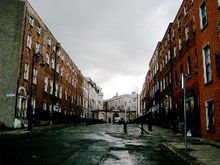Two Dublins
 I’ve recently read two books of 1950‘s fiction influenced by James Joyce and about Dublin: one written by a namesake, James Plunkett, The Trusting and the ed, (1959) a collection of short stories; and The Ginger Man, (1955) by the Irish-American expatriate J.P. Donleavy. A paperback copy of The Trusting and the ed sat in in the top of my father’s bedroom dresser drawer during most of my childhood. My father’s parents found the book during a 1970 trip through Ireland. While in my grandfather’s ancestral hometown in County Armagh they were derided by a man for seeking their "roots” and were hurt and offended enough they vowed never to return to Ireland. The cover photograph of a twilit bank of orange black clouds towering biblically above a dark crested mountain (which I now imagine are the Dublin Mountains) and its back photograph of James Plunkett hair curled and eyes squinched in wind worked their way into my imagination. They are now as familar to me as my own face. The Ginger Man I found in a used bookstore on Walnut Street in Philadelphia on a winter day a few years ago.
I’ve recently read two books of 1950‘s fiction influenced by James Joyce and about Dublin: one written by a namesake, James Plunkett, The Trusting and the ed, (1959) a collection of short stories; and The Ginger Man, (1955) by the Irish-American expatriate J.P. Donleavy. A paperback copy of The Trusting and the ed sat in in the top of my father’s bedroom dresser drawer during most of my childhood. My father’s parents found the book during a 1970 trip through Ireland. While in my grandfather’s ancestral hometown in County Armagh they were derided by a man for seeking their "roots” and were hurt and offended enough they vowed never to return to Ireland. The cover photograph of a twilit bank of orange black clouds towering biblically above a dark crested mountain (which I now imagine are the Dublin Mountains) and its back photograph of James Plunkett hair curled and eyes squinched in wind worked their way into my imagination. They are now as familar to me as my own face. The Ginger Man I found in a used bookstore on Walnut Street in Philadelphia on a winter day a few years ago.Both books are of a dim, parochial nearly claustrophobic 1950’s Dublin little changed since Joyce. The Ginger Man involves a Protestant Irish-American, Sebastian Dangerfield, who is studying at Trinity College Dublin while habitating a dank flat with Marion, his long-suffering English wife who is driven to hysetria by his drinking and philandering. The novel features farcical Freudian scenes such as Sebastian rushing to catch a train after using a public bathroom and exposing himself unintentionally to shocked riders (including a horrified hiding behind a newspaper) and pulling a chain to flush a toilet and sending his own excrement pouring through a kitchen ceiling on to Marion’s screaming head. Donleavy's part mocking, part admirable portrayal of Dublin is, if often transparently Joycean, at moments beautiful. “Eight o’clock. The streets were wet, puddles of water on the granite blocks. Western clouds swarming soundlessly catching up the turf smell from the steaming chimney pots on this chilly Saturday night. Bird feet moving his soul through this Danish city. The horse voices of newsboys punctuating the corners of streets behind. Up here in West Friar Street I can hear them saying rosaries.”
James Plunkett’s real name was James Plunkett Kelly which I was disappointed to discover while doing some research following his at 83 in 2003. Plunkett’s most famous book was a sweeping 1969 novel Strumpet City about the "Great Lockout" of trade unionists in Dublin in 1913.
A Joycean passage I admire is from "The Damned" in which an altar boy, consumed by dread for the sake of his father’s soul, walks through Dublin's early morning streets to attend mass.
His feet rang emptily on the path. Sometimes from a faraway street he heard feet as early as his own give answer. And now three different bells were ringing. The street lamps were on, which made it look like night, but the darkness was cold and more lonely than night darkness. From around corners a small sharp wind made ambush now and then and in the unswept gutters pieces of paper flurried ands scraped. He passed the graveyard of the Protestant Cathedral. Once it belonged to the Catholics but the Protestants took it. They desecrated the Altar and the holy vessels. They would burn forever in hell for that. He glanced fearfully through the railings at the leaning headstones and thought of their blackened tormented faces howling through the flames and their screaming, struggling ness, and then he thought of himself, his soul pure and white, hurrying through the dark, windy early-morning streets to serve Mass and receive the Immaculate Host which was God Incarnate, the Unsuffering Victim, and he shuddered ... As he looked at the headstones a piece of white paper whirled past him in with startling suddenness. The wind pinned it against the railings. It flapped and struggled. Then it went whirling and spinning again into the darkness among the tombstones, lost and helpless, pursued by the wind. He hurried on, frightened.
